Recently, the National Conservatism conference was held in London between May 15th – 17th 2023. Attendees included some well-known conservative figures such MPs Jacob Rees-Mogg, Michael Gove, and Suella Braverman, also Yoram Hazony of the Josef Herzl Institute, Darren Grimes of GB News, and ‘social commentator’ Toby Young amongst many others. The name National Conservatism seems to have inspired a wide array of accusations that it resembles fascism, notably through the similarity of naming between National Socialism and National Conservatism. Some of the speakers at the conference were targeted on social media and subjected to numerous accusations of either being fascist or promoting fascist ideas. Using the National Conservatism official twitter feed that was updated throughout the conference, I consider whether or not there are grounds for considering National Conservatism as a new incarnation of fascism.
As a source for what constitutes fascism, I predominantly utilise John E. Richardson’s 2017 book ‘British Fascism: A Discourse-Historical Analysis’. In this work, he robustly aggregates the ways in which fascist discourse manifests across differing incarnations of fascist ideology. However, it is particularly relevant given its British focus as British fascism tends to have its own unique ingredients. Although I reference other authors, they are mostly the works referenced by Richardson so I somewhat follow his lead.
As a side note, it is important to remember that fascism does not arrive advertising itself as fascism. No fascist admits to being fascist. Further, as with all ideologies, it is difficult to pin down the exact ingredients required to classify an ideology as its namesake. Unfortunately, this is often used by the proponents of said ideology to deceive, deny, or gaslight. Finally, I make no agreement or disagreement with anything the National Conservatism speakers state as on the surface their arguments seem reasonable but behind them often lie ideological duplicity. My only intent is in determining the presence of fascistic sentiment. Let’s look at the connections through their own words.
Anti-Intellectualism
Davies & Lynch (2002: 114) describe how fascism is anti-intellectual on the basis that it puts an emphasis on “emotion rather than reason” due to its reliance on myth-making, irrationality, and spiritual, religious language. In the following two tweets, the “intelligentsia” are to be ignored and those in ivory towers, a pejorative term referring to academics, should be considered of less importance than common sense.

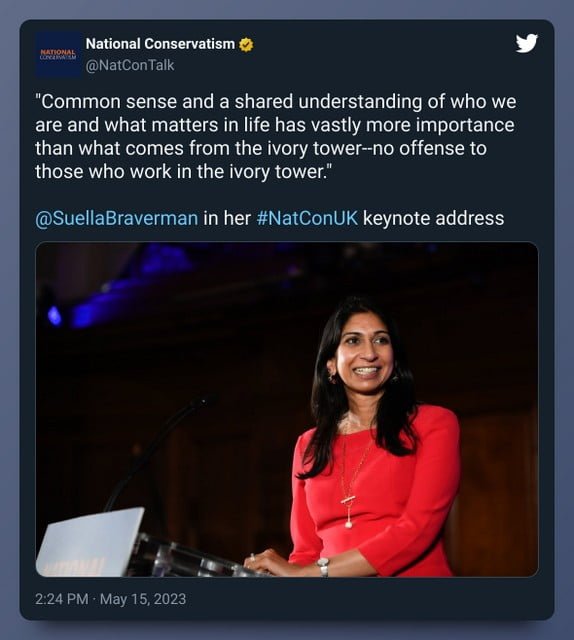
Anti-liberal
Anti-liberal sentiment is associated with fascist ideology insofar as liberalism is seen as decadent (Turner, 2006: 196). This decadence refers to what is considered a hedonistic, materialistic, consumerist, or freedom-without-consequences set of values. Further, Woodley (2010: 133 cited in Richardson) argues fascism is a type of “post-liberal capitalism” suggesting that it is a position which has superseded liberalism.

More examples here:

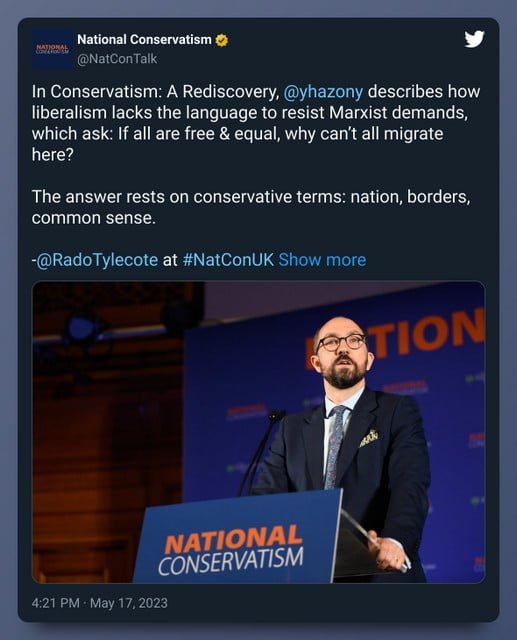
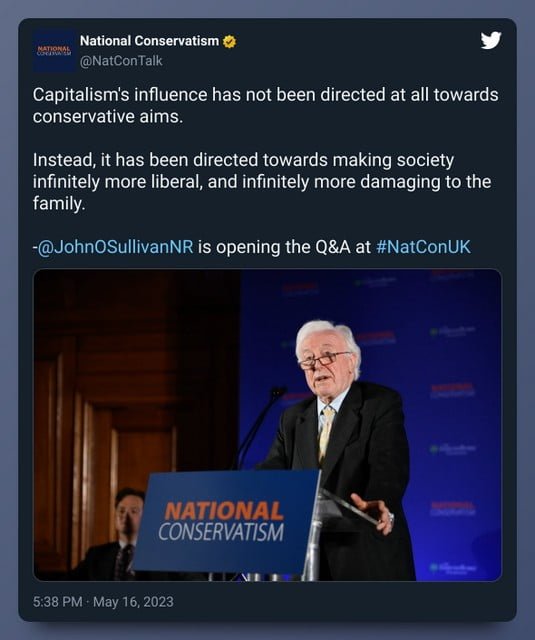

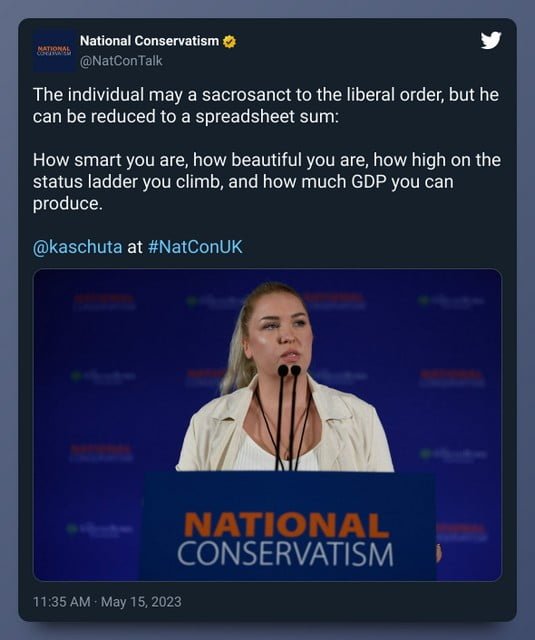
Anti-immigration
Anti-Immigration has always been a core feature of fascism regardless of which type of fascism one considers. In tandem with anti-immigration is the way in which existing immigrants are treated. Almost as if she is one-woman crusader against immigration, Suella Braverman has overseen some pretty cruel things (see here, here, and here). Regardless, the anti-immigration position is very loud and clear both in the conference and out of it.


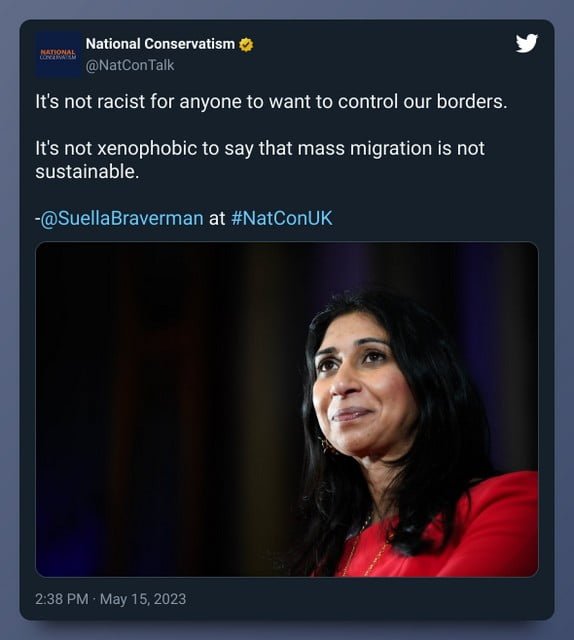
Gender
Gender also plays a central role within the strong hierarchies of fascism. In the following quote from Stanley (2020), they note not only this hierarchy and the threat that gender outside of a strict binary plays, but also the rising political incarnation of fascism.
“Given the significance of gender hierarchy to fascist ideology, that politicians have been trying to foment mass hysteria about trans women is unsurprising if this effort is understood as a manifestation of fascist political tactics and a sign that fascist politics is ascendant. Conversely, the growing acceptance of trans women is a strong affirmation of liberal democratic norms”.

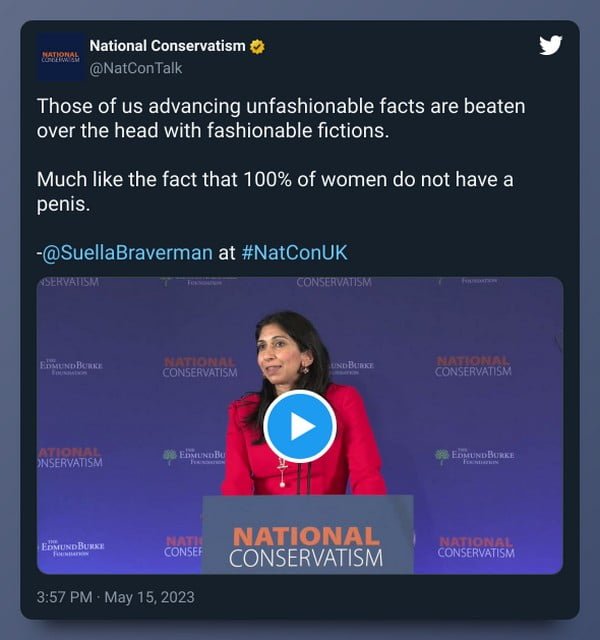
Eugenics
Although in traditional fascist manifestations race has been at the forefront of eugenics, race itself does not necessarily have to take a front role. It could simply buy into the nationalism concept by making sure that all who are born are British and not foreign. Further, Miller (1999: 100 cited in Richardson) argues that scientific framework of eugenics pushes the notion that reproduction is the natural role for women.



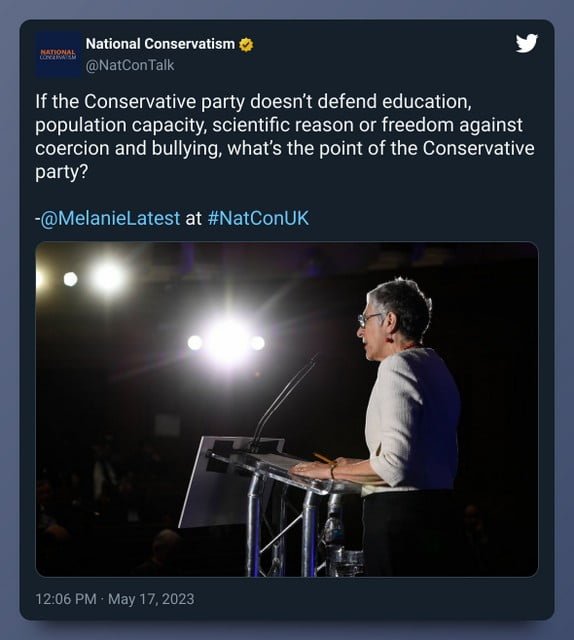
…and a couple more
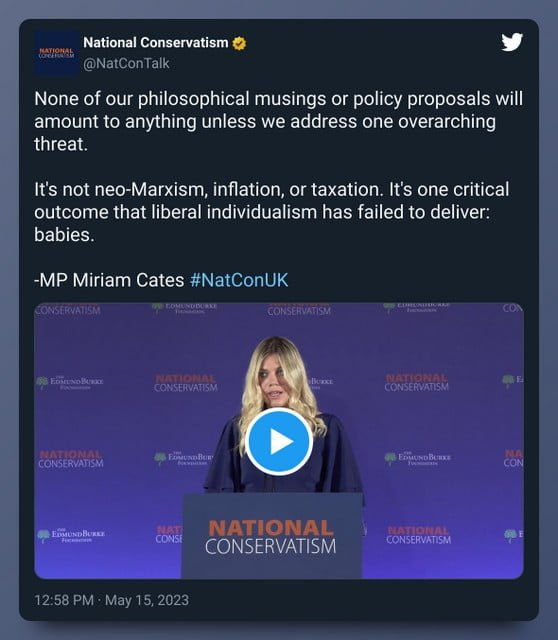
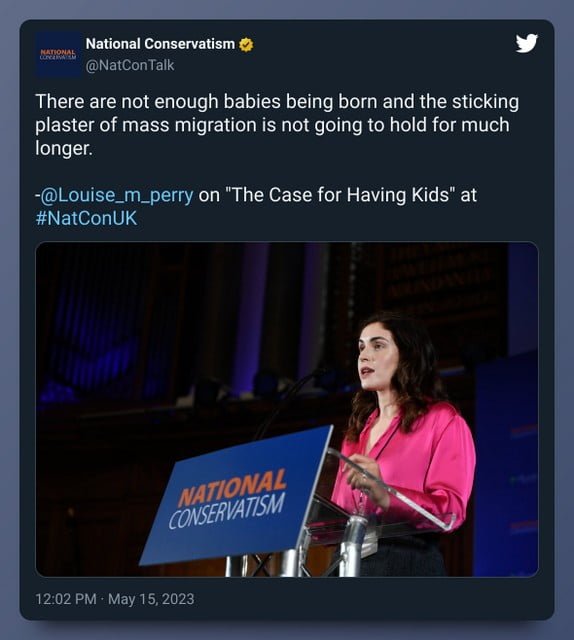
Although not too much is given away in those tweets, it should also be noted that some who are involved in the National Conservative movement such as Toby Young and James Orr have been linked to eugenics by other writers.
Family
This of course raises the question of family. Richardson (2017: 174) notes that, under fascism, women’s role is reduced to being wife and mother. Davies & Lynch (2002: 126-127) argue that fascist thinking on the family tends to resemble classic conservative views, again with traditional roles for women as housewife and men as workers. Further there is an opposition to abortion, divorce, and LGBT but support for reproduction as a national duty and for parents as centralised to rearing children.
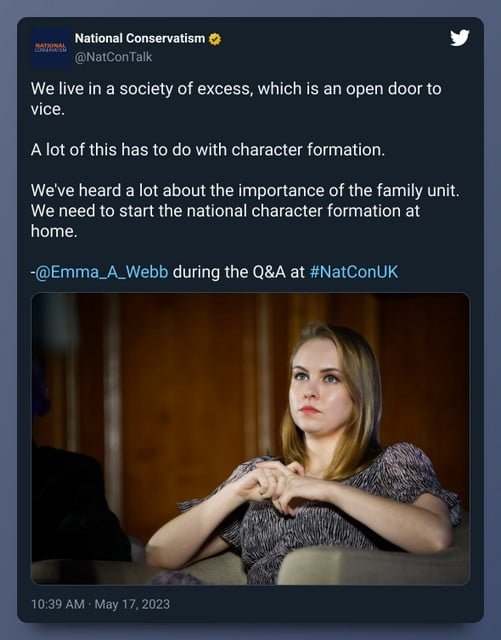
Lots more here showing the centrality of the family to National Conservative focus…



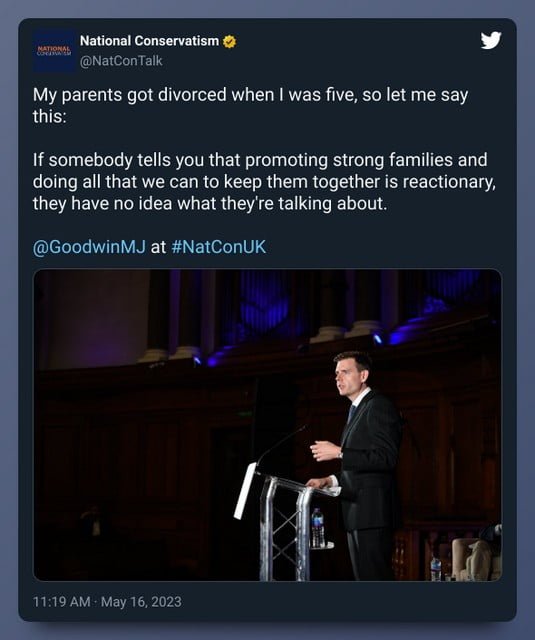





in this last one, note the myth of ‘ancient tradition’…

Economic
Fascism opts for certain economic patterns. One of these, argues Richardson (2017: 49), is autarky. Autarky refers to the notion that the nation should be self-sufficient and independent from foreign trade. This supposedly strengthens the nation. The main idea is that exporting demonstrates the strength of the nation and showcases industrial or technological superiority but also spreads influence. Imports are seen as a drain on the national coffers or demonstrates a weakness by being reliant on other states for goods.
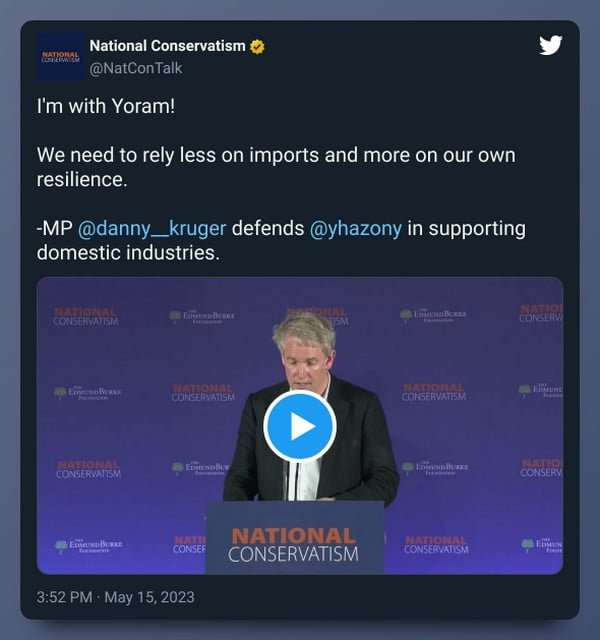

Nationalism
It is pretty hard to miss the overt nationalism on display, the name National Conservatism kind of gives it away as too does the shower of red, white, and blue. However, nationalism is absolutely at the core of fascism. Woodley (2010: 19 cited in Richardson) is not purely nationalism but, rather, “the projection of unity and identity as mythic responses to capitalist modernization”. This activates people into engaging with nationalist myth. Modernisation is often a code word for neoliberalisation so the mythical responses to the existing neoliberal order could be seen as anti- or post-liberal.

Myth
As mentioned, national myths become centralised in the rhetoric of fascist nationalism. Terms such as unity, traditions, identity, patriotism, glory, and virtue become amplified:



…and in this one, the myth of the conservative nation:

Projection
Richardson (2017: 25) quotes Kitchen (1976: 86) who argues that projection is also a feature. This manifests either in the language of the irrational concepts of authority, obedience, duty, or honour which reiterates the aforementioned anti-intellectualism. Further, Kitchen argues that there is an amplifying of the hidden enemy who threaten the nation. These tweets will require a little more context. This first tweet shows pure projection onto a hidden enemy:

The projection in the above tweet is the idea that conservatives don’t polarise people and that it is the hidden enemy, the left (whoever that might be), that is doing it. Yet, despite all the culture wars that the conservatives have continually stoked, the one that stands out the most is the ‘Two Nation Hegemonic Project’ in which Scott Lavery (2019: 153-182) dissects the Conservative and Liberal Democrat coalition in 2010. Following from the 2008 financial crisis, the Conservatives at the helm split the nation into two to purposefully create the whole strivers VS skivers situation around welfare. Lavery framed this as the ‘Two-Nation Hegemonic Project’. It makes for great reading and I would personally recommend it. In pitting ‘strivers’ vs ‘skivers’ through an all-out propaganda campaign is not polarisation, then I do not know what is.
In this next tweet projection occurs again when they raise the spectre of the left taking control of arts and culture. They seem to have forgot that the conservatives have cut arts and culture funding continuously since they got into power.

Finally, in this tweet, they try to pretend that they are not the ‘establishment’. They imply that they cannot understand why the public are being ignored by the establishment whilst simultaneously being that very establishment:

The enemy
Continuing the theme of the enemy, the existence of an ‘enemy’ is present throughout fascist rhetoric. This ‘enemy’ tends to fall under terms such ‘threat’ or ‘attack’ on culture or values of the nation. Let’s look at some of the enemies:

It’s everyone (note the anti-intellectualism again):

The ‘woke’ enemy (again, whoever that is):
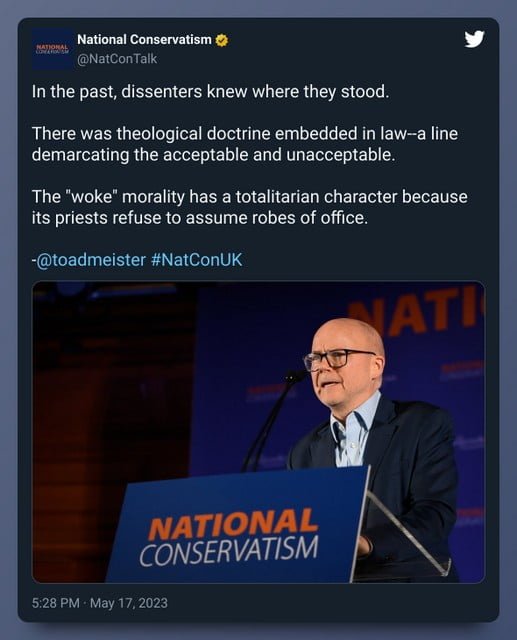
This tweet presents woke as being undiagnosed suggesting that woke is a pathological dysfunction:
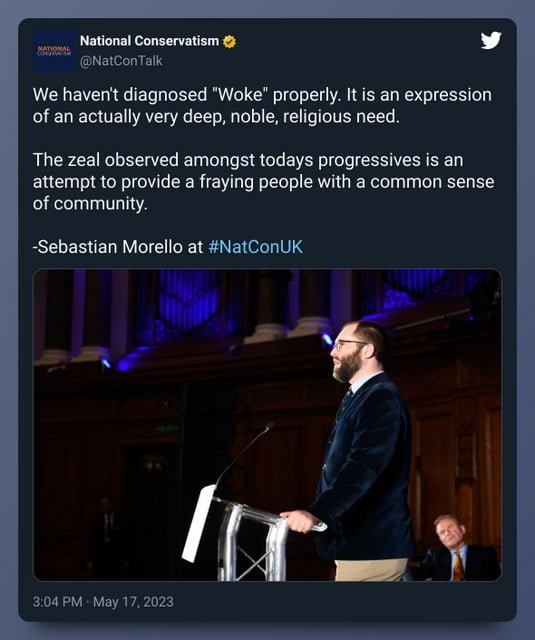
They also cannot get enough of the ‘Left’ as an enemy despite not saying who the ‘Left’ are and despite the fact that the Left has been out of power since before Margaret Thatcher:

Other examples of the ‘Left’ as an enemy:

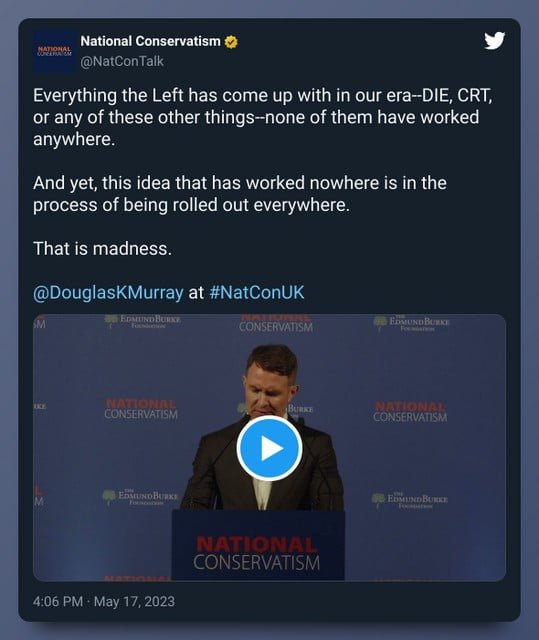
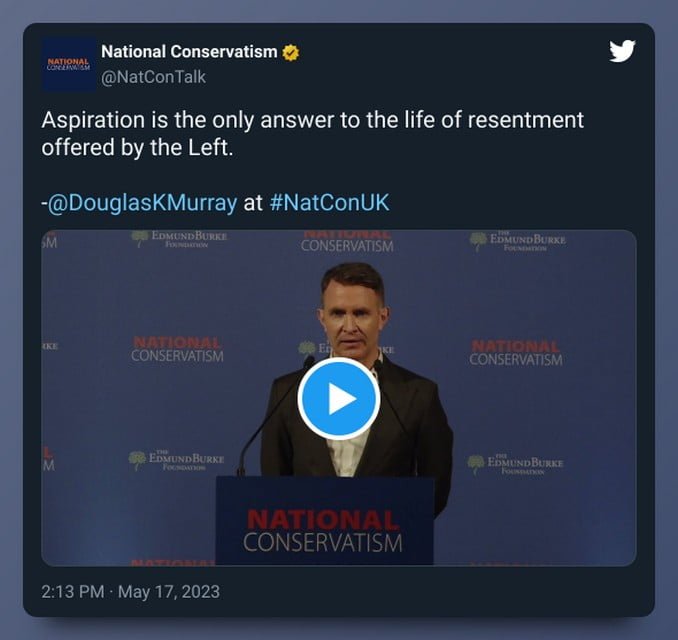
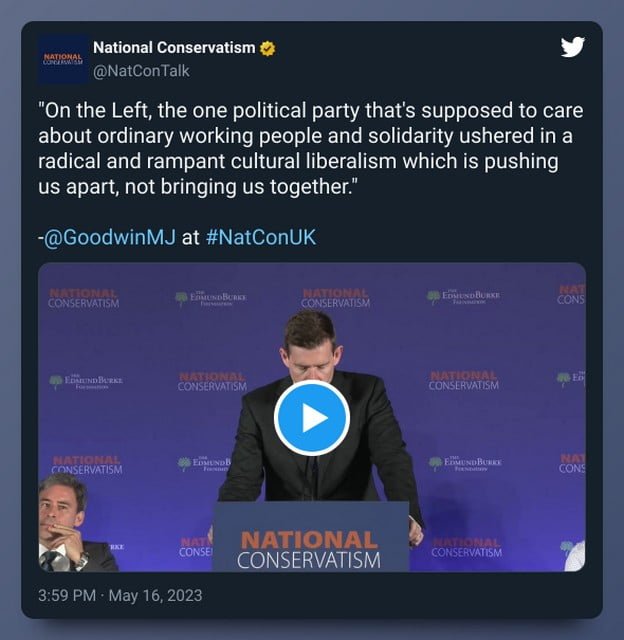
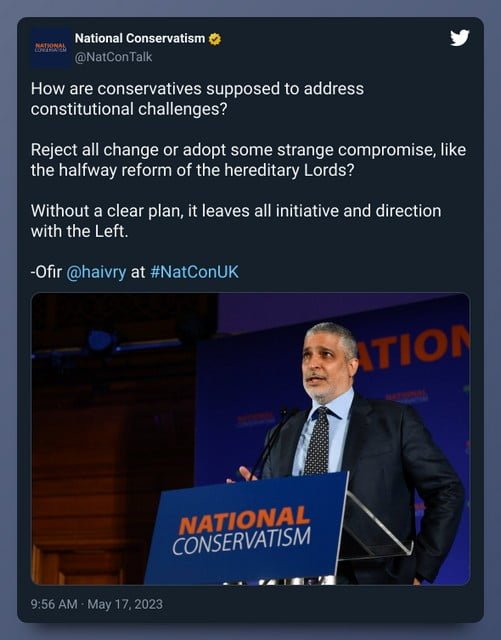
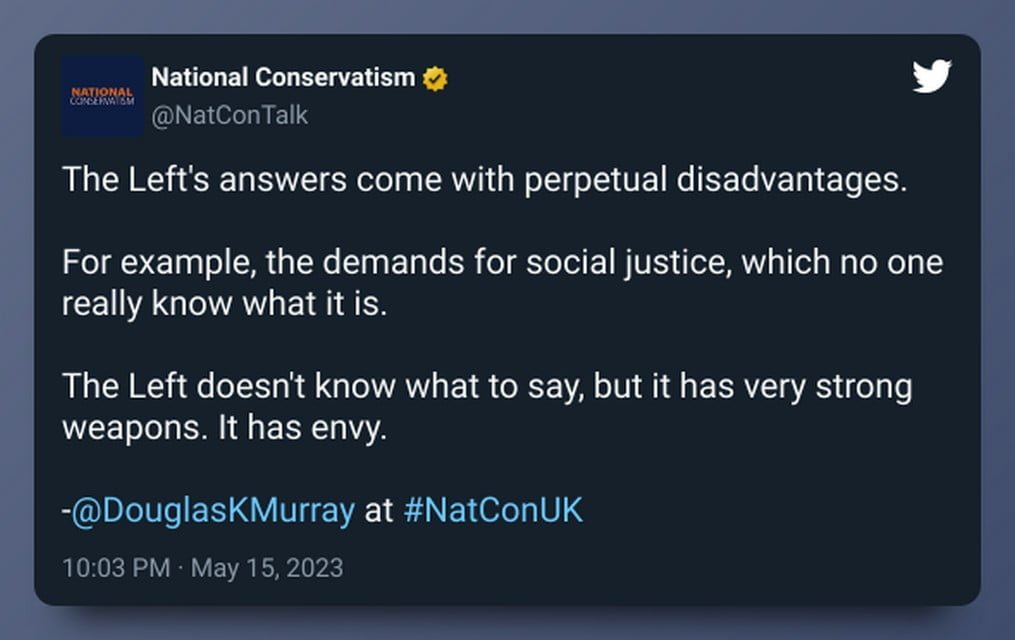
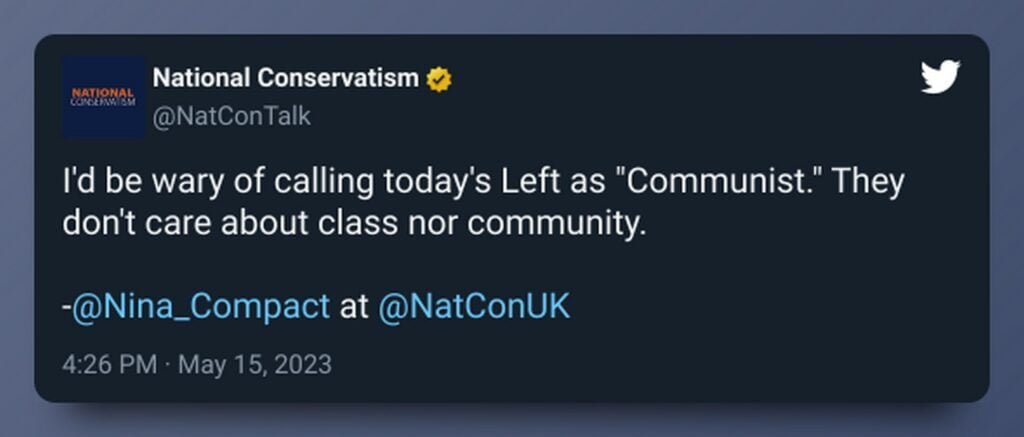
It’s social movements
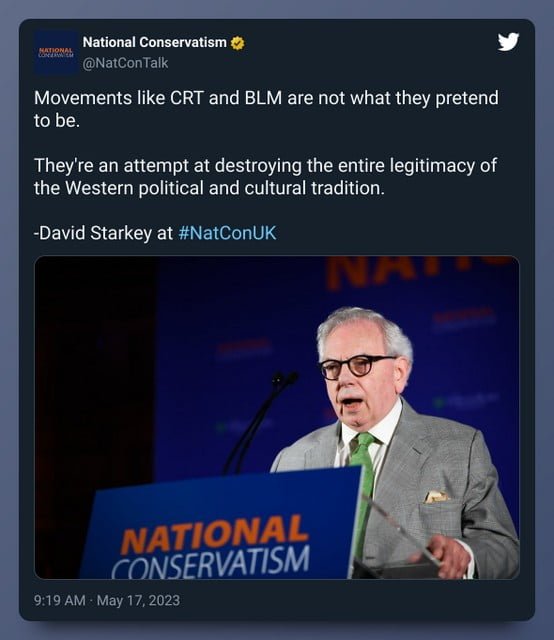
It’s the ‘elite’ (while pretending not to be elite (more projection again)):

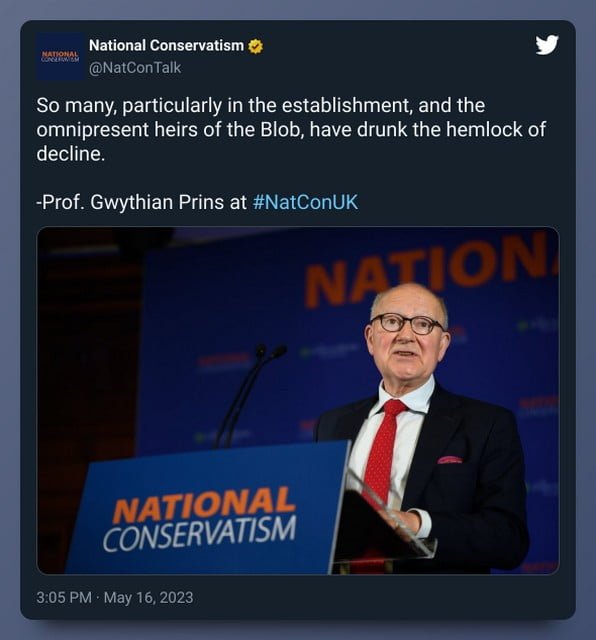
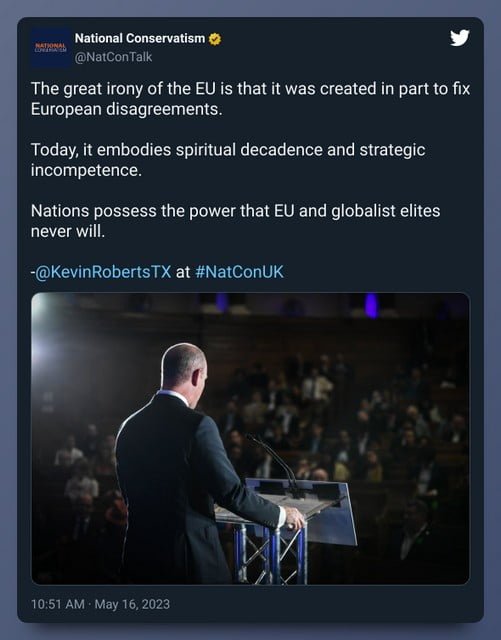
It’s China:

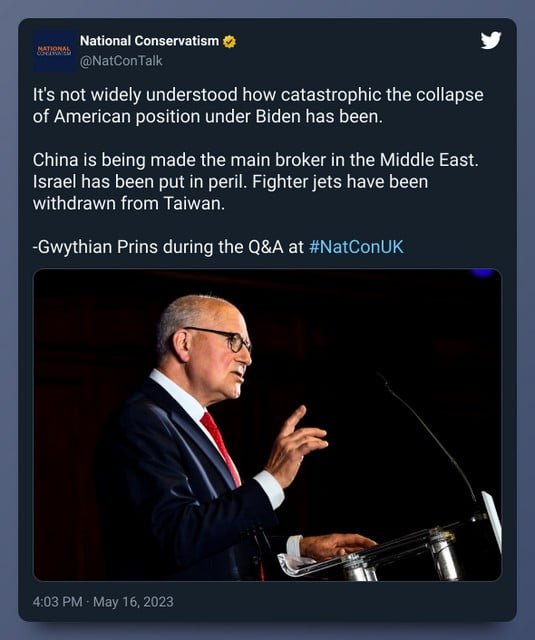
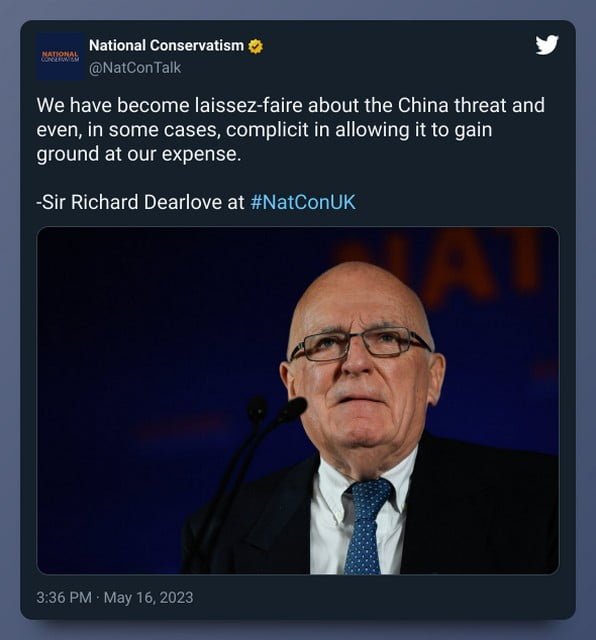
Christianity
It is often argued that Christianity is neither here nor there when it comes to fascism. However, these tend to overlook the notion of Christofascism. This does not equate necessarily to Christianity itself being fascistic. Rather, as Driver (1981: 19) states, it is the “political direction of all attempts to place Christ at the center of social life and history”. Further, “we would stress the identification of Jesus with the poor and the destitute, thereby finding it impossible also to identify him, as past ages did, with offices of privileges”. This indicates the use of those in high positions utilising the name of Jesus and Christianity as a political tool whilst in privileged positions. As well all know, conservatives are no friends of the poor.
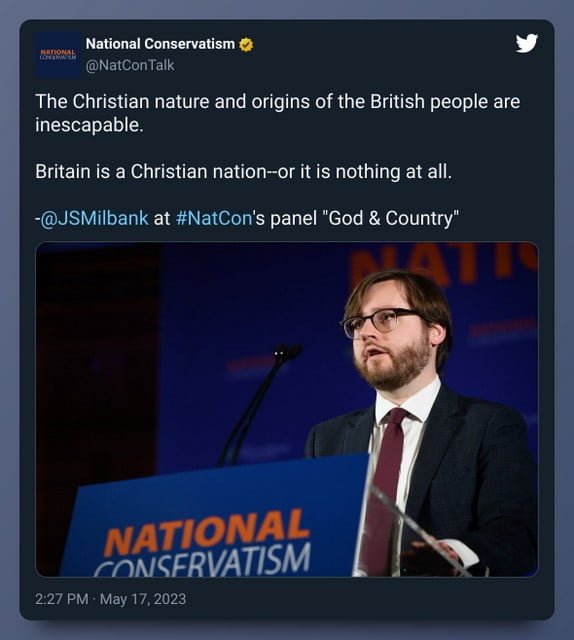


It is fair to say that what has been shown here demonstrates some fascistic leanings. National Conservatism seems to be ticking all the boxes for openly demonstrating their alignment with fascism. I wonder if it is a coincidence that their abbreviated name is Nat-C.
References
Billig, M. (1978) Fascists: A social psychological view of the National Front. London: Harcourt Brace Jovanovitch.
Davies, P. & Lynch, D. (2002). The Routledge Companion to Fascism and the Far Right. Routledge.
Driver, T.F. (1981). Christ in a Changing World. Crossroad Publishing Company.
Kitchen, M. (1976) Fascism. London: Macmillan.
Lavery, S. (2019). British capitalism after the crisis. Cham, Switzerland: Palgrave Macmillan
Miller, L. (1999) Ideological themes of eugenics and gender in contemporary British fascism: a discursive analysis. Unpublished Doctoral Thesis. Loughborough University
Neocleous, M. (1997) Fascism. Buckingham: Open University Press
Richardson, J. E. (2017). British fascism: a discourse-historical analysis. Stuttgart: Ibidem-Verlag.
Stanley, J. (2020). How fascism works: The politics of us and them. Random House Trade Paperbacks.
Turner, B. S. (2006). The Cambridge Dictionary of Sociology. Cambridge university press.
Woodley, D. (2010) Fascism and Political Theory: Critical perspectives on fascist ideology. Oxon: Routledge










